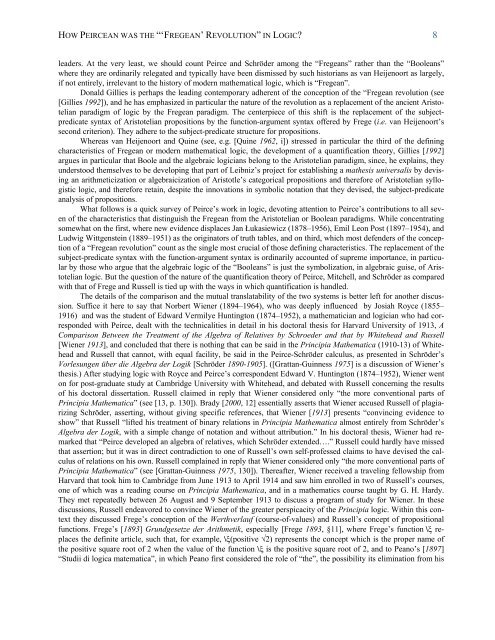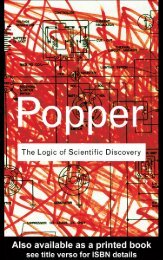Create successful ePaper yourself
Turn your PDF publications into a flip-book with our unique Google optimized e-Paper software.
HOW PEIRCEAN WAS THE “‘FREGEAN’ REVOLUTION” IN LOGIC? 8<br />
leaders. At the very least, we should count Peirce and Schröder among the “Fregeans” rather than the “Booleans”<br />
where they are ordinarily relegated and typically have been dismissed by such historians as van Heijenoort as largely,<br />
if not entirely, irrelevant to the history of modern mathematical logic, which is “Fregean”.<br />
Donald Gillies is perhaps the leading contemporary adherent of the conception of the “Fregean <strong>revolu</strong>tion (see<br />
[Gillies 1992]), and he has emphasized in particular the nature of the <strong>revolu</strong>tion as a replacement of the ancient Aristotelian<br />
paradigm of logic by the Fregean paradigm. The centerpiece of this shift is the replacement of the subjectpredicate<br />
syntax of Aristotelian propositions by the function-argument syntax offered by Frege (i.e. van Heijenoort’s<br />
second criterion). They adhere to the subject-predicate structure for propositions.<br />
Whereas van Heijenoort and Quine (see, e.g. [Quine 1962, i]) stressed in particular the third of the defining<br />
characteristics of Fregean or modern mathematical logic, the development of a quantification theory, Gillies [1992]<br />
argues in particular that Boole and the algebraic logicians belong to the Aristotelian paradigm, since, he explains, they<br />
understood themselves to be developing that part of Leibniz’s project for establishing a mathesis universalis by devising<br />
an arithmeticization or algebraicization of Aristotle’s categorical propositions and therefore of Aristotelian syllogistic<br />
logic, and therefore retain, despite the innovations in symbolic notation that they devised, the subject-predicate<br />
analysis of propositions.<br />
What follows is a quick survey of Peirce’s work in logic, devoting attention to Peirce’s contributions to all seven<br />
of the characteristics that distinguish the Fregean from the Aristotelian or Boolean paradigms. While concentrating<br />
somewhat on the first, where new evidence displaces Jan Łukasiewicz (1878–1956), Emil Leon Post (1897–1954), and<br />
Ludwig Wittgenstein (1889–1951) as the originators of truth tables, and on third, which most defenders of the conception<br />
of a “Fregean <strong>revolu</strong>tion” count as the single most crucial of those defining characteristics. The replacement of the<br />
subject-predicate syntax with the function-argument syntax is ordinarily accounted of supreme importance, in particular<br />
by those who argue that the algebraic logic of the “Booleans” is just the symbolization, in algebraic guise, of Aristotelian<br />
logic. But the question of the nature of the quantification theory of Peirce, Mitchell, and Schröder as compared<br />
with that of Frege and Russell is tied up with the ways in which quantification is handled.<br />
The details of the comparison and the mutual translatability of the two systems is better left for another discussion.<br />
Suffice it here to say that Norbert Wiener (1894–1964), who was deeply influenced by Josiah Royce (1855–<br />
1916) and was the student of Edward Vermilye Huntington (1874–1952), a mathematician and logician who had corresponded<br />
with Peirce, dealt with the technicalities in detail in his doctoral thesis for Harvard University of 1913, A<br />
Comparison Between the Treatment of the Algebra of Relatives by Schroeder and that by Whitehead and Russell<br />
[Wiener 1913], and concluded that there is nothing that can be said in the Principia Mathematica (1910-13) of Whitehead<br />
and Russell that cannot, with equal facility, be said in the Peirce-Schröder calculus, as presented in Schröder’s<br />
Vorlesungen über die Algebra der Logik [Schröder 1890-1905]. ([Grattan-Guinness 1975] is a discussion of Wiener’s<br />
thesis.) After studying logic with Royce and Peirce’s correspondent Edward V. Huntington (1874–1952), Wiener went<br />
on for post-graduate study at Cambridge University with Whitehead, and debated with Russell concerning the results<br />
of his doctoral dissertation. Russell claimed in reply that Wiener considered only “the more conventional parts of<br />
Principia Mathematica” (see [13, p. 130]). Brady [2000, 12] essentially asserts that Wiener accused Russell of plagiarizing<br />
Schröder, asserting, without giving specific references, that Wiener [1913] presents “convincing evidence to<br />
show” that Russell “lifted his treatment of binary relations in Principia Mathematica almost entirely from Schröder’s<br />
Algebra der Logik, with a simple change of notation and without attribution.” In his doctoral thesis, Wiener had remarked<br />
that “Peirce developed an algebra of relatives, which Schröder extended….” Russell could hardly have missed<br />
that assertion; but it was in direct contradiction to one of Russell’s own self-professed claims to have devised the calculus<br />
of relations on his own. Russell complained in reply that Wiener considered only “the more conventional parts of<br />
Principia Mathematica” (see [Grattan-Guinness 1975, 130]). Thereafter, Wiener received a traveling fellowship from<br />
Harvard that took him to Cambridge from June 1913 to April 1914 and saw him enrolled in two of Russell’s courses,<br />
one of which was a reading course on Principia Mathematica, and in a mathematics course taught by G. H. Hardy.<br />
They met repeatedly between 26 August and 9 September 1913 to discuss a program of study for Wiener. In these<br />
discussions, Russell endeavored to convince Wiener of the greater perspicacity of the Principia logic. Within this context<br />
they discussed Frege’s conception of the Werthverlauf (course-of-values) and Russell’s concept of propositional<br />
functions. Frege’s [1893] Grundgesetze der Arithmetik, especially [Frege 1893, §11], where Frege’s function�\� replaces<br />
the definite article, such that, for example, \�(positive √2) represents the concept which is the proper name of<br />
the positive square root of 2 when the value of the function \� is the positive square root of 2, and to Peano’s [1897]<br />
“Studii di logica matematica”, in which Peano first considered the role of “the”, the possibility its elimination from his





